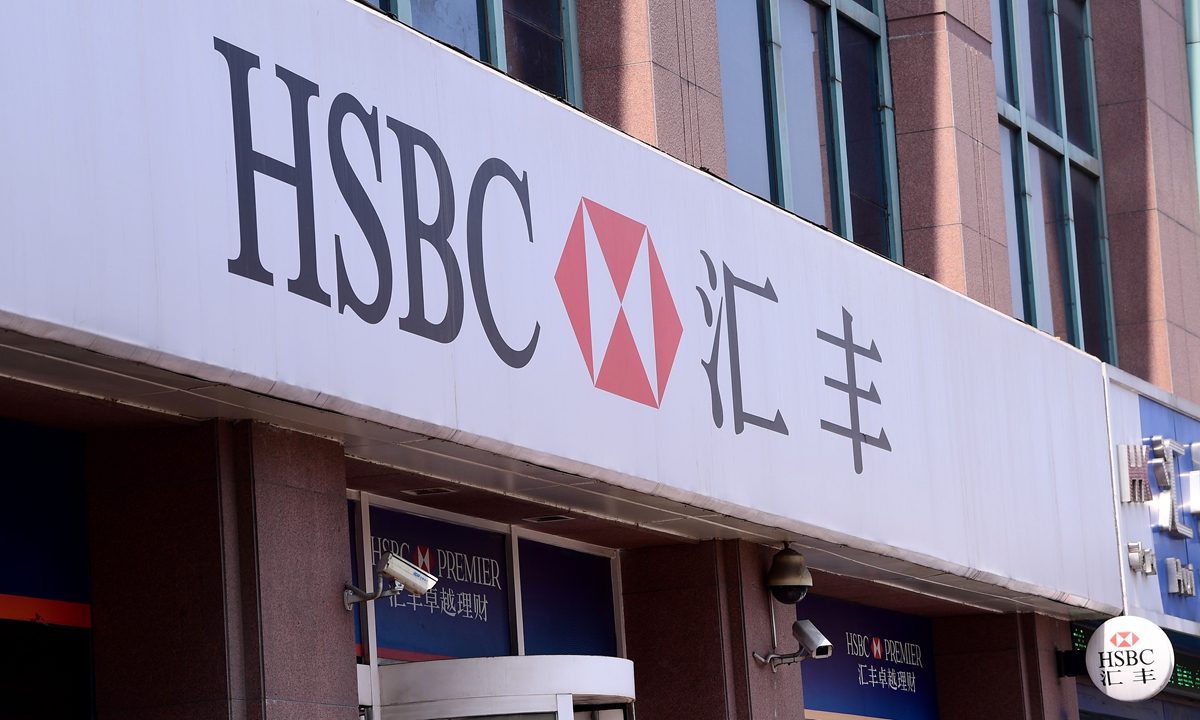HSBC shares sink on scandal report
By Li Qiaoyi Source: Global Times Published: 2020/9/21 22:22:52
Role in ‘framing’ Huawei may lead to place on China’s entity list: analysts

HSBC
HSBC's shares plunged to their lowest level since 1995 in Hong Kong on Monday, as its reported involvement in a dirty money scandal utilizing the bank's accounts in Hong Kong dealt a fresh blow to its already sagging reputation.
The new revelation could subject the UK's biggest bank to a regulatory clampdown in Hong Kong, experts said, noting that the bank's widely reported role in collusion with the US to frame Chinese tech giant Huawei also puts it on the verge of being added to China's unrelia-ble entity list.
HSBC's shares fell 5.33 percent to close below HK$30 ($3.87) on Monday, after allegations on Sunday that the bank allowed fraudulent transfers of millions of dollars across the globe, despite being aware of problems.
The British banking giant "moved the money through its US business to HSBC accounts in Hong Kong in 2013 and 2014," the BBC reported, citing leaked secret files that detailed the bank's role in the $80 million fraud.
The bank spotted suspicious transactions going through its systems, but it failed to act in a timely way to close the accounts.
Suspicious transactions the bank identified as having moved through its accounts in Hong Kong between 2011 and 2017 topped $1.5 billion, and $900 million of those transactions were linked to overall criminal activity, the BBC reported, citing an analysis by the International Consortium of Investigative Journalists (ICIJ).
HSBC's role in the scam, if confirmed, will reveal loopholes in its internal risk systems, and the lapses will indisputably hit its reputation in the Hong Kong market, Dong Dengxin, director of the Finance and Securities Institute at Wuhan University of Science and Technology, told the Global Times on Monday.
Hong Kong regulatory authorities are likely to take action against the bank's malpractice in the scam, Dong said.
"Its involvement in the 'funny money' scandal will also worsen its plight in the Chinese mainland market, where the UK bank has become known for allegations of acting as a backstabber to frame Huawei," he went on to say.
"We do not comment on suspicious activity reporting," an HSBC spokesperson told the Global Times on Monday.
"All of the information provided by the ICIJ is historic and predates the conclusion of our Deferred Prosecution Agreement in 2017. Starting in 2012, HSBC embarked on a multi-year journey to overhaul its ability to combat financial crime across more than 60 jurisdictions…. HSBC is a much safer institution than it was in 2012," the spokesperson said.
Also noteworthy are allegations about HSBC's participation in entrapping Huawei, which could land the lender on China's highly anticipated unreliable entity list, analysts said.
Although the Ministry of Commerce didn't name specific companies that could be targeted when it unveiled provisions for the Chinese alternative to the US Entity List on Saturday, observers pointed out that companies like HSBC and FedEx, which have had problematic business records in the Chinese market, are highly likely to be put on the list.
There's a chance HSBC will be put on the list, and it could face limits on its busi-ness and granting of licenses, and on-site inspections of its facilities in the Chi-nese mainland, Dong said.
"The US has put hundreds of companies on its Entity List, and its 'China initiative' has targeted dozens of Chinese individuals and companies… China should react much faster," Liu Shuwei, a Chinese economist and professor specializing in Chinese enterprises at the Central University of Finance and Economics, told the Global Times on Monday.
For instance, US courier service FedEx, which was heavily criticized for diverting packages sent to Huawei to the US, and HSBC, which has been criticized for allegedly aiding in the arrest of Huawei CFO Meng Wanzhou in Canada, should be candidates for the list, according to media reports and some analysts.
"Those two should have been put on the list long ago," Liu said.
FedEx allegedly handled a package bound for Hong Kong that contained con-trolled knives in 2019, at a time when it was still under formal investigation for a gun delivery in China and for "misrouting" shipments intended for Huawei.
The latest evidence Huawei has provided to a Canadian court shows how HSBC deliberately set a trap, pieced together materials and fabricated evidence, to frame Huawei, which may also sink the lender's reputation and prospects in the industry, according to some analysts.
However, the unreliable entity list is not intended to target any particular business, according to Gao Lingyun, an expert at the Chinese Academy of Social Sciences in Beijing.
With the newly released provisions fleshing out the legal groundwork for China to prevent market disruption by individuals, companies and institutions, the na-tion won't put violators on the list without solid evidence, Gao told the Global Times.
The government would consider summoning the affected entities and offering them opportunities to rectify their wrongdoings, he said, describing the list as a viable component of the nation's law-based governance of its market-oriented economy.